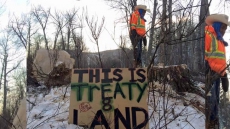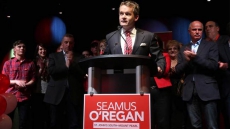OTTAWA — Justin Trudeau says his government's maiden budget keeps faith with Canadians who voted for the Liberals in last fall's election, even though it breaks a central campaign promise to run up "modest" deficits.
Kicking off a promotional blitz Wednesday to sell the big-spending budget, the prime minister insisted it delivers on the promise to revive the stagnant economy.
"That was a very clear commitment we made and that's exactly what we've done," he told CBC radio's Ottawa morning show.
The Liberals promised to run up deficits of no more than $10 billion a year before returning to balance in the fourth year of their mandate.
Instead, Tuesday's budget projects $113.2 billion in red ink over the next five years, including a $29.4-billion deficit in 2016-17, $29 billion the following year and almost $23 billion in 2018-19. It does not specify a date for returning to balance.
But Trudeau disputed suggestions that he's broken a core campaign vow, saying it's "not true" that his government will pile up a deficit three times larger than promised.
"The promise I made was to invest in the future of this country. That's what Canadians told me we needed and we were going to do it responsibly and that's exactly what we've done," he said.

"Unlike what the Conservatives have been doing ... trying to cut our way to prosperity, we know we need to invest to get to prosperity. Canadians understand that. That's exactly what they voted for."
The budget details $11 billion in new spending on everything from Indigenous Peoples to post-secondary education, middle and modest income families, municipal infrastructure, the recently unemployed, veterans and seniors.
Trudeau said that economic conditions have deteriorated since the platform was crafted, which only reinforced his belief that investments were needed to spur growth.
With interest rates at a record low and Canada's debt to GDP ratio the lowest among G7 countries, Trudeau argued it's the perfect time to make investments aimed at getting the economy moving again. Indeed, he said he had a responsibility to do so.
He said the budget puts the government on track to return to balance by the fifth year but warned that "depends entirely" on economic growth.
In a separate interview with Radio-Canada's Ottawa-Gatineau morning show, Trudeau argued that the objective of the budget was not "to reach some mathematical balance" but to give "optimism and trust" to Canadians.
"This is not a mathematical equation; it is money invested in people's lives that will have a positive impact, real impact, in their lives. And that is a good thing because people need this."

Despite the big spending, the budget also delayed or reneged on some campaign promises, including putting off some investments in infrastructure to later years.
Trudeau told Global BC's morning show that was simply a recognition that major infrastructure projects like public transit "aren't ready to get built starting next week." The government is still committed to pouring $60 billion in new spending into infrastructure over 10 years, he said, but wants to ensure it spends the money wisely on projects that will create long-term growth.
Trudeau's series of radio and TV interviews Wednesday launched a full court press to sell the budget.
His cabinet ministers, meanwhile, fanned out across the country to highlight various aspects of the big-spending budget.
Finance Minister Bill Morneau defended the government's budget as a way to promote economic growth over the long term with a focus on benefits for the country's middle class.
"At the core is the notion when you have an economy that works for the middle class you have a country that works for everyone," Morneau said at a breakfast speech in Ottawa.
He highlighted a boost to child care benefits and increases to post-secondary education grants as a means to that end. Morneau also reinforced the government's pledge to end boil-water advisories that plague aboriginal communities throughout the country as part of the budget's plan to give $8.4 billion to indigenous peoples over the next five years.
Treasury Board president Scott Brison, Economic Development Minister Navdeep Bains, Immigration Minister John McCallum and Transport Minister Marc Garneau were also to be deployed Wednesday to tout the budget across the country.
On Thursday, Small Business Minister Bardish Chagger, Natural Resources Minister Jim Carr and Infrastructure Minister Amarjeet Sohi will do the same.
But if initial reaction is any gauge, the budget may not need a hard sell. With billions in spending splashed around, the budget appeared to satisfy many constituencies.

Dozens of stakeholder groups gathered on Parliament Hill to provide budget reaction Tuesday offered an unusual consensus in lauding the Liberal efforts.
And the sharpest critics left the big-spending budget comfortably parked in the "Goldilocks" zone between too hot and too cold.
The Canadian Taxpayers Federation offered a withering review of Morneau's string of deficits and the absence of any timetable for a return to balance.
"If this government held a contest to pick a title for this budget, the winner would probably be 'Spendy McDebtface,'" said the tax lobby group's director, Aaron Wudrick.
But the left-leaning Canadian Centre for Policy Alternatives took Morneau to task for spending too little, noting next year's deficit amounts to just 1.5 per cent of GDP, smaller than any federal deficit run between 1974 and 1996.

"The Liberals are spending in the right places, but the amounts aren't up to the task," said the think-tank's senior economist, David Macdonald. "The deficit is too small to really tackle Canada's biggest economic challenges: unemployment and slow growth."





